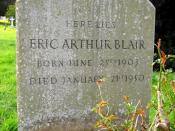People sometimes undergo difficult situations when they are forced to carry out orders by authority. George Orwell's "A Hanging" is a descriptive essay about capital punishment. The setting of this essay is placed in an early twentieth-century prison in Burma, a country ruled by the British Empire. Considering that George Orwell was an imperial police officer in Burma, it is highly probable that this essay is related to his own experience. The essay, presented through the eyes of the narrator, examines primitive human nature. Orwell develops his essay through characters who perform their job responsibilities, through an appearance of a dog to show humanity, and through the inner conflict of the narrator as he participates in and observes the execution.
In terms of responsibility, as colonial officers, all of the characters perform their jobs in an impersonal way. In the morning, the jailers prepare the routine execution for their prisoners who are kept in "animal cages."
As the officers follow the directions to execute a Hindu prisoner, who has barely a motive to live, they treat the prisoner in such a way it shows that they do not care about his feelings. Two tall Indian warders surround the puny prisoner and bring him to the gallows. To emphasize the importance of getting the job done and moving to the next responsibility, the head jailer shouts, "Well quick march, then. The prisoners can't get their breakfast till this job's over" (Orwell "A Hanging" 1216). The head jailer demonstrates that the prisoner is only an object to be eliminated, and it is his duty to execute on time and to manage other prisoners. When it is about time for the execution, the prisoner calls "his god" loudly: "Ram! Ram! Ram! Ram!" All who are present, as well as the narrator, desire...


